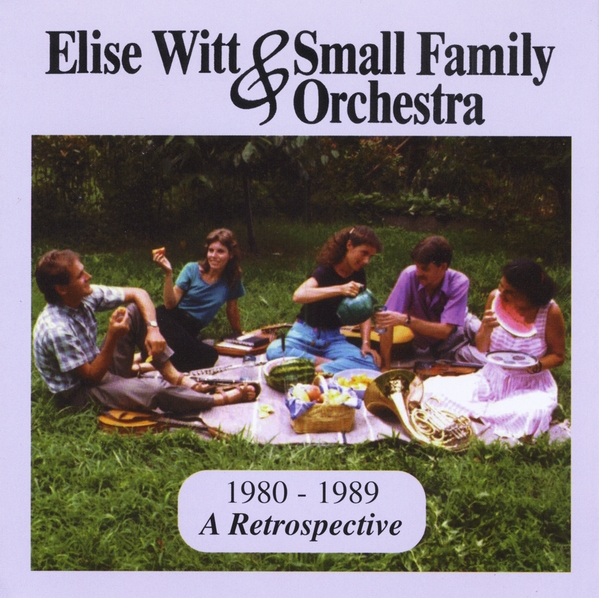Description
Elise Witt & Small Family Orchestra in the press:
– Mark Childress Southern Living June, 1983
“They give voice to a new generation of Southern songwriters…”
– Nashville Banner May, 1989
“Inspired!…a welcome rarity in the music world.”
– Jill Adams Lacey The Hornpipe Folk Music in the Southern Regions Autumn, 1989
“Elise Witt & Small Family Orchestra always have presented one of the freshest and most interesting repertoires and collective sounds in folk. If you thought you might be able to put a tidy definition on them before, forget it. On this album they prove just how versatile they are.
Four of the songs – “Guardabosques,” “A Los Santos,” “Sing to Me the Dream,” and John McCutcheon’s “No Mas, No More” – have Nicaraguan roots, a result of the band’s 1985 tour of that country. Mix those with two spoofs, “Cackling Hen Cafe” and “Modern Food,” a couple of plaintive ballads like “Don’t Let Me Come Home a Stranger” and Mike Craver’s “Fishing for Amour,” and a medley of German children’s rounds, and you have an appetizing gallimaufry. But wait – there’s more. Bluegrass(!): Rick Ruggles’ “The Red Shirt” summons wistful, haunting memories of the Herb Pedersen-era Dillards. Rounding out a very full album are two songs borrowed from the Austin-based Uncle Walt’s Band.
The Orchestra’s unique blend of guitar, mandola, and fiddle with reed instruments (clarinets, flute, and French horn) has been a source of intrigue for many delighted listeners. It’s truly a musical hodge-podge, but a…can’t resist a pun…spendidly “well-orchestrated” one.”
– Jon Pareles New York Times November, 1986
“…amiable…homey…sweet…among the best.”
– Keith Graham Atlanta Journal Constitution September, 1984
“Despite little airplay, good records, loosely labeled ‘folk,’ keep coming out on small or independent labels. This second album by Elise Witt and Small Family Orchestra ranks with the best. Produced in Atlanta, it features an eclectic repertoire (international, early jazz and blues, contemporary folk), beautiful clear solos by Ms. Witt, tight vocal harmony and unique instrumentation (generally Ms. Witt on guitar; Mary Witt, French horn; Rick Ruggles, mandolin; Steve Harris, violin; and Beth Heidelberg, clarinet).
The lyrical “You I Want to See,” written by SFO friend Steve Runkle is worth the album’s price. “Whatever Became of Me,” penned by Cabbagetown troubadour Joyce Brookshire, and The Carter Family’s “You’ve Been A Friend to Me” stand out, too. If, as many claim, there’s a folk revival in the works, the SFO deserves to be in the forefront.” – Keith Graham Atlanta Journal Constitution September, 1984
– Georgia State University Signal July, 1983
“…without a question the best album by a local band this year.”
– Georgia Tech Technique April, 1983
“Superb. That in twenty-five words or less, describes the new album by Elise Witt & Small Family Orchestra. It is doubtful that even twenty-five superlatives could do justice to the beauty and artistry of this, well, superb album.
The appeal lies mainly in Witt’s liquidly melodious voice and Tommy Goldsmith’s savvy production. But there’s more to it than that, of course… The balance of instruments (violin, mandolin, French horn, clarinets, flute, guitars, and sandpaper) with voices is almost magical, and makes the album only more entrancing with repeated listenings.
Therein lies the major attraction of the album. It sound great on first listening, and gets better with each playing. Here is a band – an “orchestra “- that will bear watching.
And listening, of course.”
– The Spectator Raleigh, NC May 1983
“From the unlikely burg of Decatur, Georgia has come a local release of exceptional caliber, Elise Witt & Small Family Orchestra. The low budget black and white cover is deceptive…musically, it would be difficult to put together a more worldy mixture. Included are French, German, Neapolitan, and Spanish songs, in addition to two originals by producer Tommy Goldsmith and a batch of songs by lesser known but talented writers. Two songs by Steve Runkle stand with the best melancholy love odes.
The orchestra achieves a European feel through combinations of instruments such as clarinet, accordion, French horn, violin, and flute, a soft-toned rich latticework of bistro sound. This is excruciatingly romantic on the ethnic songs. Elise Witt has a beautiful voice, particularly suited to interpreting poetry in song.”
